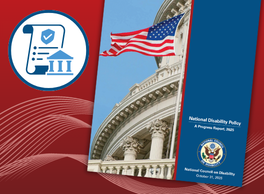

Do I Need an Elevator? Accessibility Requirements and Best Practices

2025 National Progress Report
This year’s annual report from the National Council on Disability (NCD) covers information related to healthcare, transportation, education, employment, and several other key social areas. Learn more about the NCD’s 2025 progress report.

Accessible Presentations: Google Slides and Grackle Guides
Boise State University has released accessibility best practices and a guide for Google Slides and Grackle Slides. Learn more about making slides accessible in Google and Grackle.

New Training Course: Accessible Tourism and the ADA
The Rocky Mountain ADA Center has a new, free, online course aimed at communities and businesses. The training offers a certificate and covers digital access, transportation, lodging, and attractions. Learn more about Accessible Tourism and the ADA.

Answer: Titles II and III of the ADA contain a definition and other specific requirements for trained service animals regarding their public access protections. However, under Title I, any request related to employment—including a modification to a no-pets or no-animals policy—must be addressed as a reasonable accommodation request. This can include asking for documentation that confirms the disability and functional limitations.
Unlike other parts of the ADA, Title I does not distinguish between service animals or emotional support animals (ESAs) when it comes to accommodation requests. Therefore, employers must evaluate requests for assistance animals the same way they would any other accommodation request. Relevant factors could include, but are not limited to:
Employers should discuss any concerns with the employee as part of the interactive process before denying a request. There may be reasonable solutions that eliminate the concern which an employer is required to consider. For example, if toileting is a concern, an employee could request a modified break schedule that allows them to take their animal outside to relieve itself. Employers can also consider a trial period to determine whether the animal’s presence will be an effective and reasonable long-term solution.
As with other Title I requests, if an accommodation is reasonable and effective, it should be allowed.
Resource(s):
Learn more by visiting our ADA Frequently Asked Questions.

EEOC v. ALM Freight, LLS and LMDmax Corp.
This lawsuit states that a Michigan Amazon delivery company and employment agency refused to provide a sign language interpreter to a deaf applicant for her first-day orientation. According to the EEOC’s lawsuit, LMDmax advised the applicant after her request that ALM does not provide interpreters and would not proceed with her hiring.
EEOC v. Holsum of Fort Wayne, Inc.
An Indiana wholesale bakery will pay $50,000 to settle a lawsuit alleging that they would not allow an employee to use their walker at the facility. According to the suit, a supervisor permitted an employee to bring a walker into the area previously, but after a year, the bakery told her she could no longer use the walker as it violated their personal items policy. The bakery refused to grant an exception to the policy and forced the employee to take medical leave. A few months later, Holsum fired her because she was unable to return to work without the assistance of a walker.
EEOC v. Wendy’s International, LLC
According to the lawsuit, Wendy’s would not let an Ohio district manager return to work after approved leave for disability-related surgery although his healthcare provider released him to return to work. Instead, Wendy’s required him to remain on leave, conditioned his employment on his ability to work without any restrictions, and then fired him.
EEOC v. Wrightway Ready-Mix, LLC and Wright Concrete & Construction, Inc.
According to the suit, the hiring manager and HR told a job applicant that Wrightway would not hire him due to a longstanding company policy prohibiting employment of workers who take methadone, a form of prescribed medication used to treat opioid addiction. Because of these policies and practices, the lawsuit charged that Wrightway has excluded a class of workers from employment in violation of the ADA.
Walmart will pay $60,000 to settle a lawsuit that managers at a new location in New York discontinued approved effective accommodations designed to help an employee with hearing, speech and cognitive impairments understand her daily assignments. This failure to reasonably accommodate her disabilities led to a conflict about her tasks for the day, which prompted Walmart to fire her for insubordination, according to the suit.
Staffing agency, Peak Performers, will pay $160,000 to settle a lawsuit which states that following a suicide attempt resulting from mental health conditions, an executive assistant with a disability requested approximately 4-6 weeks of unpaid leave to receive outpatient medical treatment. The company denied her request and fired her. Ultimately, the executive assistant completed her treatment and would have been able to return to her job within three weeks.

Lyster v Amazon.com Services LLC
This class action lawsuit claims Amazon unfairly penalized New York warehouse workers who requested reasonable accommodations by forcing them onto unpaid leave, then threatening termination for taking too much leave time. Learn more: Amazon Attendance Policy Punishes Disability, Lawsuit Says.

Torres v. Society for Human Resource Management (SHRM)
In this lawsuit, an applicant claims SHRM violated the ADA by not allowing her to have her service dog and rescinded a conditional job offer based on her disability. The animal allegedly assists the applicant in managing her diabetes. Learn more: SHRM Service Dog Litigation: Answer and Possible Defenses.

DOJ v. Polyclinic, d/b/a Optum Care Washington
Polyclinic has resolved allegations that one of its medical facilities failed to provide sign language interpreter services for a patient who is deaf and blind on multiple occasions. Under the terms of the settlement, Polyclinic will pay $25,000 to the patient who had multiple appointments either cancelled or where inadequate interpreter services were provided. Polyclinic has also set up a $350,000 fund to compensate any other patients who were impacted by the clinics’ failure to provide appropriate interpreter services during the Claims Period between January 1, 2021, and September 30, 2025.
DOJ v. Arizona Department of Corrections, Rehabilitation, and Reentry (ADCRR)
The DOJ has concluded its Nov. 16, 2023, agreement with ADCRR, which resolved their findings that ADCRR violated Title II of the ADA by discriminating against incarcerated individuals with vision disabilities. Under the agreement, ADCRR implemented a series of reforms, including revised policies and practices, personnel training, providing necessary modifications, aids, and services, and providing assistive technology to people with vision disabilities in custody. ADCRR also implemented screening and documentation procedures and appointed ADA coordinators to facilitate implementation of the agreement across the state.

After three years of litigation, a settlement in a class action lawsuit will lead to ADA-compliant upgrades like private bathrooms, accessible voting machines and new signage at municipal buildings serving Detroit and Wayne County. Some of the compliance work was completed during the lawsuit, but officials have to complete all changes by the end of 2026. Learn more: ADA Settlement Brings Changes to Detroit Courthouses.

DOJ opened an investigation after receiving complaints alleging that these three parks violate the ADA by banning guest use of certain walkers, known as “rollator walkers.” Complainants allege that they cannot access the parks without their rollators and the only alternative the parks offer would require them to use mobility aids that are inappropriate for their individual disabilities and to incur additional charges, among other allegations. If you believe you have been a victim of disability discrimination by United Parks & Resorts Inc., including parks such as SeaWorld Orlando, Busch Gardens Tampa Bay, and Aquatica Orlando, please file a complaint with the Civil Rights Division online at www.civilrights.justice.gov, or by calling the Department’s toll-free ADA Information Line at 1-800-514-0301 (1-833-610-1264 (TTY)).
DOJ v. Autumn Leaf Academy, Inc.
A day care center in Plant City, Florida called Autumn Leaf Academy, Inc. was investigated by the DOJ after receiving a complaint from the parents of a child with Down syndrome, alleging the day care center refused to enroll their daughter because she uses a gastronomy tube (i.e., “G-tube”) to eat. Under the settlement agreement, Autumn Leaf Academy agreed to training and policy changes to ensure compliance with the ADA. They will also pay the child’s family $2,000 in compensatory damages.
According to the settlement agreement, a member at 24-Hour Fitness complained that the accessible shower in the women’s locker room had not been available for months. An investigation by the U.S. Attorney’s Office confirmed the accessible shower was unusable for several months due to ongoing repairs and maintenance. The fitness chain has agreed to training and policy changes to ensure compliance with the ADA and will pay the complainant $2,000.
DOJ v. Brattleboro Memorial Hospital (BMH)
An investigation revealed BMH failed to ensure effective communication for several individuals whose primary means of communication is American Sign Language (ASL). Under the resolution agreement, BMH agreed to provide qualified interpreters to ensure effective communication; create a grievance procedure; provide training to its personnel; and designate a program administrator who will coordinate access to auxiliary aids and services 24/7. The resolution agreement also establishes a fund to compensate people who were affected by BMH’s failure to provide qualified sign language interpreters or other auxiliary aids and services from 2018 to 2025.

Douglass v. Husqvarna Professional Products, Inc.
A proposed settlement has been reached that would resolve this class action lawsuit alleging that Husqvarna Professional Products, Inc. violated the ADA by failing to ensure its website and mobile apps do not discriminate against individuals who are blind or who have a visual disability. Under the settlement, Husqvarna agrees to make its website and any new websites or mobile apps it develops or acquires accessible. Learn more: Notice of Proposed Settlement of Class Action Lawsuit.

